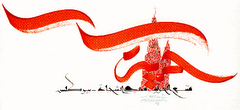Between Chapter VI & VII
All
through the Syrian crisis, both Russia and USA have applied pressure on
different parties. This period has lead the two super powers to reach an understanding
in order to avoid the collapse of Syria into endless chaos, recognizing the need for a political solution. From this point, the
Russian initiative has represented the spark of hope for such a settlement.
As dealing with the Syrian crisis has shifted to the UN Security
Council the new struggle between the super powers revolves around the issue of chemical
weapons and “Geneva II”. This can be seen in the dispute between Moscow who is pushing to adopt Chapter
VI of the UN Charter that deals with the peaceful negotiation and settlement of
disputes and Washington that prefers adopting Chapter VII, which allows for a
wider range of military and non-military actions to restore and maintain peace.
The Russians are looking for a political resolution, while the US insists that
the priority is to shape a new full-power transitional government.
But why is the US insisting on adopting chapter VII?
Since the beginning of the crisis in Syria, American policy has
tied a settlement in Syrian to a regional one. As such, Chapter VII would
logically give full control of terms and implications for a political
settlement. Moreover, by the adopting Chapter VII, Washington can maintain the
effectiveness of its international alliance.
On the other hand, the Russian policy of adopting Chapter VI allows
it to maintain its position. With a priority on ending the violence in Syria,
it can keep all of the pending issues of the Middle East far from any military options.
Not surprisingly, the Iranians also prefer this option. By adopting such a policy,
Moscow aims to weaken the American alliances, and to position itself as a key
part of regional issues.
The dispute between adopting Chapter VI and VII will undoubtedly
have an impact on both a regional and international level. Some protagonists
will pull back from the dispute, while others will seek to leverage it to
reposition themselves. The Iranians for example have skillfully adopted this
policy and we are likely to see a shift in relations between the US and Iran towards
more open communications.
This re-positioning might not be limited to the Iranians, other
regional players may also take the opportunity. While Turkey is dealing with
internal issues, Egypt is preparing to return to the regional arena. The Saudis
appear to be influenced by the active Iranian diplomacy, and may be pushed to
adopt progressive steps towards restoring the balance of regional relations.
In the end, there will also be impacts on Syria and some can
already be seen in various statements by Syrian officials. Even Jordan won’t be
far from the regional and international changes.
Dr. Amer Al Sabaileh
http://amersabaileh.blogspot.com







Aucun commentaire:
Enregistrer un commentaire